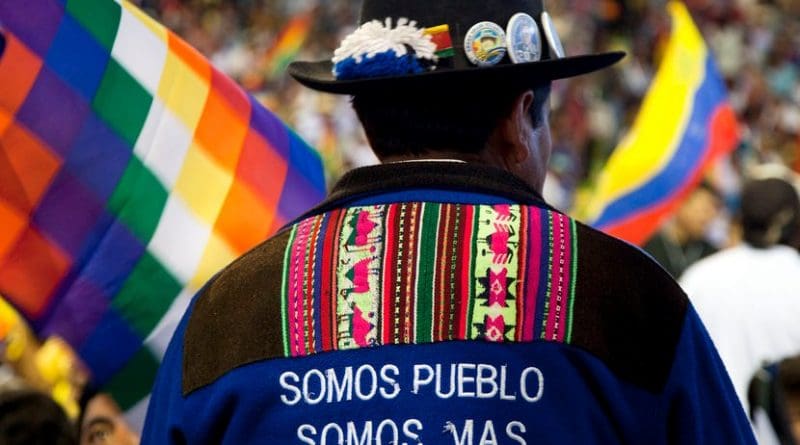Bolivia: Amnesty Decree Opens Door To Impunity
A presidential decree approved by Bolivia’s Congress in February 2021 opens the door to impunity for serious crimes, Human Rights Watch said Thursday.
The decree provides a blanket amnesty to people prosecuted during the previous government for crimes related to the “political crisis” that started in October 2019. It appears designed to favor supporters of the pro-government party Movement to Socialism (MAS, in Spanish).
“There is strong evidence indicating the previous government persecuted MAS supporters in politically motivated cases,” said José Miguel Vivanco, Americas director at Human Rights Watch. “But granting a blanket amnesty to MAS supporters without clear criteria undermines victims’ access to justice and violates the fundamental principle of equality before the law.”
Instead, prosecutors and judges should review all cases and withdraw or dismiss baseless or disproportionate charges, and in cases in which there were due process violations, apply the remedies provided by Bolivian law, Human Rights Watch said.
Bolivia’s Congress, the Plurinational Legislative Assembly, where MAS has a majority, approved the decree on February 12. President Luis Arce, from MAS, enacted it on February 18.
After approving the decree, the Senate president, MAS leader Andrónico Rodríguez, said it will apply to his “brothers” and “colleagues” who opposed the government of former interim President Jeanine Áñez, and “have been harmed for absolutely no reason.” “What we want is that they be freed from any criminal charge,” he said. He said that the decree would be applied to “more than 1,000 people,” but neither he nor the government have published a list or any details about the specific cases.
The vagueness of the decree’s language allows for an overly broad interpretation of what crimes can be amnestied or pardoned. This is particularly problematic because legal interpretation of the decree rests with executive branch offices that lack the necessary independence, with no meaningful judicial review, Human Rights Watch said. Those offices will only have three working days after an individual files a petition to review the case and make a decision, an extremely short time period for a thorough review.
The decree can potentially result in amnesty for arson, abduction, murder, and other very serious crimes allegedly committed by MAS supporters, as Human Rights Watch documented in a September 2020 report.
The decree grants amnesty to people “who were criminally prosecuted during the de facto government, in clear violation of human rights [and] Constitutional guarantees and freedoms, for allegedly committing crimes directly related to social conflicts as part of the institutional [and] political crisis of the State that occurred in the country from October 21, 2019 to October 17, 2020.” Another article grants a pardon to people convicted of crimes “directly related” to those same social conflicts, though the decree excludes certain serious offenses from the pardon.
The decree does not provide any explanation of what crimes prosecuted during the Áñez government should be considered “directly related” to those social conflicts.
While the decree generically references “clear violation[s] of human rights [and] Constitutional guarantees and freedoms” as the justification for the amnesty or pardon, it does not lay out any mechanism or criteria to determine if those rights were violated in specific cases. Accordingly, there is a risk that the amnesty and pardon will be applied widely to cases that did not involve rights violations, Human Rights Watch said.
Other sections of the decree suggest that anyone prosecuted by the Áñez government for actions during social protests had their rights violated. Its preamble says that although “the events during recent political and institutional crisis can formally be considered crimes,” the “intention” of those who committed them was clearly not to break the law, but rather they were protesting “to defend democracy and civil and political rights.” Prosecution of those actions by the previous government was “evident political persecution,” the decree says.
Another article states that the purpose of the decree is to “reestablish civil and political rights” for those who were prosecuted “as a consequence of political and social conflicts, characterized by massive and generalized violations of fundamental rights and constitutional guarantees, that occurred during the political [and] institutional crisis of the State that occurred in the country between October 21, 2019 and October 12, 2020.”
The decree also grants amnesty and pardons to certain categories of detainees in response to the Covid-19 pandemic and to reduce severe prison overcrowding, in cases unrelated to what it calls “political persecution.” That effort is positive considering that Bolivia’s unsanitary, overcrowded detention facilities can facilitate the spread of Covid-19, endangering detainees, staff, and the community at large, Human Rights Watch said.
“The decree risks establishing a system of selective justice, allowing the government to grant amnesty to supporters who committed serious crimes, while prosecuting opponents for similar crimes,” Vivanco said. “Instead, prosecutors and judges should review all cases, remedy rights violations, and dismiss baseless or disproportionate charges, while letting the rest move forward.”

